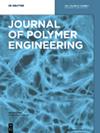利用网络结构中的可回收磁性海藻酸钠增强对 Pb2+ 的吸附,实现高再生能力
IF 1.7
4区 工程技术
Q4 POLYMER SCIENCE
引用次数: 0
摘要
本研究介绍了一种用于高效吸附重金属离子的磁性海藻酸钠水凝胶的合成方法。这种由海藻酸钠组成的水凝胶具有网络结构,有助于有效吸附金属离子。利用磁力,水凝胶可以很容易地分离和再生,表现出极佳的可回收性。与传统吸附剂相比,磁性海藻酸钠水凝胶的吸附能力显著提高,尤其是对 Pb2+ 离子的吸附能力。在 pH 值约为4 且吸附时间为 120 分钟时,水凝胶对 Pb2+ 的最大吸附容量为 137 mg/g,吸附率为 83%。吸附动力学遵循伪二阶方程,而热力学上,吸附过程遵循 Freundlich 吸附模型,吸附容量与温度和浓度呈正相关。负 ΔH 值表明这是一个放热和自发的吸附过程。在竞争吸附实验中,水凝胶对 Pb2+ 具有很强的选择性吸附。它还表现出极佳的可重复使用性,在 10 次循环后仍能保持 80% 的吸附容量。这种磁性海藻酸钠复合材料具有良好的可回收性和方便的磁分离特性,在各种应用中具有巨大的潜力。本文章由计算机程序翻译,如有差异,请以英文原文为准。
Enhanced Pb2+ adsorption using recyclable magnetic sodium alginate in a network structure for high renewable capacity
This study presents the synthesis of a magnetic sodium alginate hydrogel for efficient adsorption of heavy metal ions. The hydrogel, composed of sodium alginate, demonstrates a network structure that facilitates effective metal ion adsorption. Utilizing magnetic forces, the hydrogel can be easily separated and regenerated, exhibiting excellent recyclability. Compared to traditional adsorbents, the magnetic sodium alginate hydrogel shows significantly improved adsorption capacity, particularly for Pb2+ ions. At pH ca. 4 and an adsorption time of 120 min, the hydrogel achieves a maximum adsorption capacity of 137 mg/g for Pb2+ , with an adsorption rate of 83 %. The adsorption kinetics follow a pseudo-second-order equation, while thermodynamically, the process adheres to the Freundlich adsorption model, with capacity positively correlated with temperature and concentration. The negative ΔH value indicates an exothermic and spontaneous adsorption process. In competitive adsorption experiments, the hydrogel demonstrates strong selective adsorption towards Pb2+ . It also exhibits excellent reusability, maintaining 80 % adsorption capacity after 10 cycles. The magnetic sodium alginate composite material possesses favorable recyclability and convenient magnetic separation properties, offering significant potential in various applications.
求助全文
通过发布文献求助,成功后即可免费获取论文全文。
去求助
来源期刊

Journal of Polymer Engineering
工程技术-高分子科学
CiteScore
3.20
自引率
5.00%
发文量
95
审稿时长
2.5 months
期刊介绍:
Journal of Polymer Engineering publishes reviews, original basic and applied research contributions as well as recent technological developments in polymer engineering. Polymer engineering is a strongly interdisciplinary field and papers published by the journal may span areas such as polymer physics, polymer processing and engineering of polymer-based materials and their applications. The editors and the publisher are committed to high quality standards and rapid handling of the peer review and publication processes.
 求助内容:
求助内容: 应助结果提醒方式:
应助结果提醒方式:


